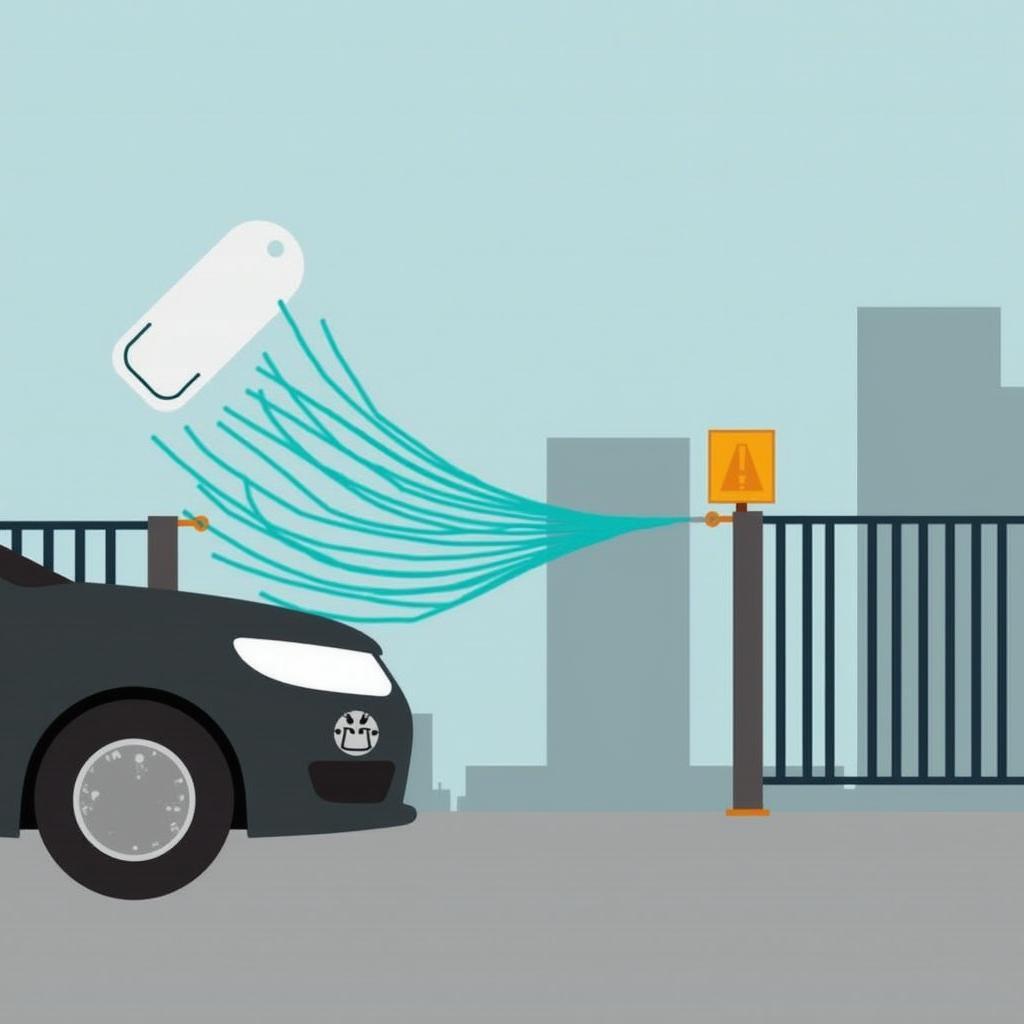RFID tags on cars are becoming increasingly common, opening up a world of convenient services. This technology allows for seamless and automated interactions, enhancing various aspects of car ownership and usage. From keyless entry and automated toll payments to vehicle tracking and personalized services, RFID tags offer a range of benefits. But how exactly do these tags work, and what services can you access with them?
Understanding RFID Technology and its Automotive Applications
RFID stands for Radio-Frequency Identification. It’s a wireless technology that uses radio waves to identify and track objects embedded with RFID tags. These tags contain a microchip and an antenna that transmit information to an RFID reader. In the automotive context, RFID tags are used for a variety of purposes, simplifying daily tasks and enhancing security.
How RFID Tags Work in Cars
An RFID tag on a car typically communicates with a reader located at a service point. When the tag comes within range of the reader, it transmits its unique identification number. The reader then processes this information and triggers a corresponding action, such as opening a gate, processing a payment, or granting access to a parking facility. This contactless interaction makes the process quick and efficient.
Keyless Entry and Ignition
One of the most common uses of RFID in cars is for keyless entry and ignition systems. The car key fob contains an RFID tag that communicates with the car’s onboard system. When you approach the car with the key fob, the doors automatically unlock, and the engine can be started with a push of a button.
Automated Toll Collection
RFID tags also facilitate automatic toll collection. Systems like E-ZPass and SunPass utilize RFID technology to deduct tolls from a prepaid account as your car passes through a toll booth. This eliminates the need to stop and pay manually, streamlining traffic flow.
Availing Services with Your Car’s RFID Tag
There are numerous services you can access using your car’s RFID tag. These services are constantly expanding as technology evolves and adoption grows.
Parking Management and Access Control
Many parking garages and lots use RFID tags for access control and payment. Your RFID tag can be linked to your parking account, allowing you to enter and exit the facility without pulling out a ticket or making a manual payment.
Vehicle Tracking and Security
RFID tags can be used to track vehicles, enhancing security and aiding in recovery in case of theft. Fleet management companies often use this technology to monitor the location and movement of their vehicles.
Personalized Services
RFID technology can be used to personalize car services. Imagine your car automatically adjusting settings like seat position, climate control, and entertainment preferences based on your RFID tag. This level of personalization is becoming increasingly feasible as technology advances.
Fueling and Charging
RFID tags can also be used for automated fueling and charging of electric vehicles. This simplifies the process and reduces the need for manual transactions.
Future Applications of RFID in Cars
The future of RFID in cars is promising. We can anticipate even more sophisticated applications emerging as technology continues to develop. From enhanced vehicle diagnostics and predictive maintenance to personalized infotainment and in-car shopping, RFID has the potential to revolutionize the driving experience.
Conclusion
RFID tags on cars are transforming the way we interact with our vehicles and access automotive services. From keyless entry and automated toll payments to enhanced security and personalized experiences, RFID technology offers a range of benefits. As technology continues to advance, we can expect to see even more innovative applications of RFID tags in the automotive industry, further enhancing convenience, efficiency, and security for drivers and car owners. If you have any further questions about how to avail services using your car’s RFID tag, consult your vehicle’s manufacturer or a qualified automotive professional.
FAQ
-
What is an RFID tag on a car? An RFID tag is a small electronic device that uses radio waves to identify and track a vehicle.
-
How do I use an RFID tag for toll payment? Your RFID tag will automatically communicate with the toll reader as you pass through the toll booth, deducting the toll from your prepaid account.
-
Can an RFID tag be used to track my car? Yes, RFID tags can be used for vehicle tracking, enhancing security and aiding in recovery in case of theft.
-
Is my car’s keyless entry system based on RFID? Yes, most keyless entry systems utilize RFID technology to communicate between the key fob and the car.
-
What are the future applications of RFID in cars? Future applications include enhanced vehicle diagnostics, predictive maintenance, personalized infotainment, and in-car shopping.
-
How can I find out more about the specific RFID services available for my car? Consult your vehicle’s manufacturer or a qualified automotive professional.
-
How can I ensure my car’s RFID tag is working correctly? Consult your vehicle’s manufacturer or a qualified automotive professional.
Possible Scenarios Where You Might Have Questions About RFID Services:
- Lost or Damaged Tag: What to do if your RFID tag is lost, damaged, or stops working.
- Compatibility Issues: Ensuring your car’s RFID tag is compatible with various service providers.
- Privacy Concerns: Understanding data security and privacy related to RFID tracking.
- Troubleshooting: Addressing issues with RFID-based systems like keyless entry or toll collection.
Further Exploration:
For more information about car technology and services, check out our articles on [link to other relevant articles on your site].
Need Help?
Contact us on WhatsApp: +1(641)206-8880 or Email: [email protected]. Our 24/7 customer support team is here to assist you.


